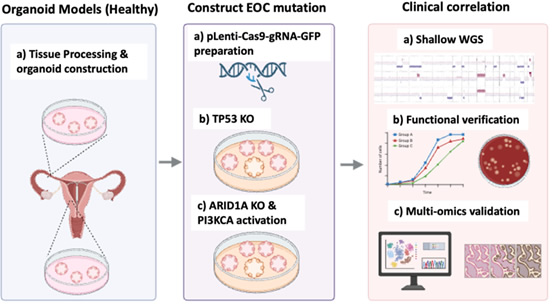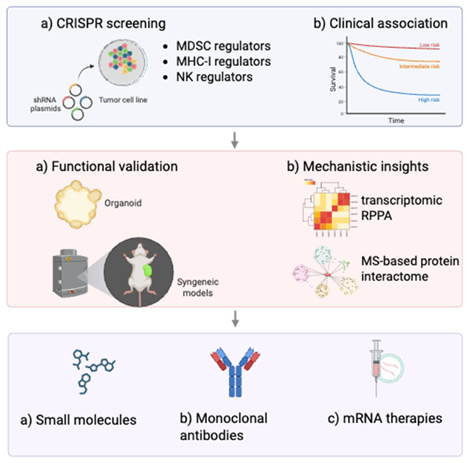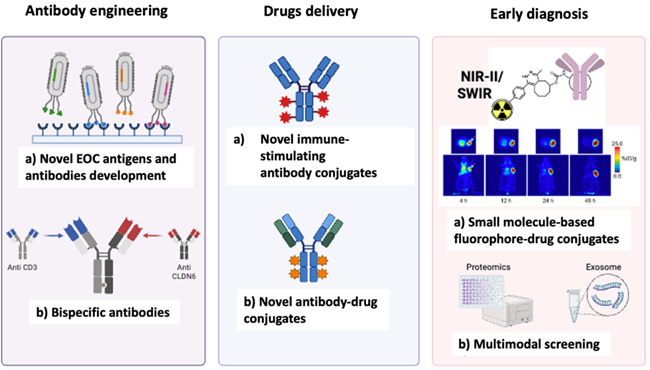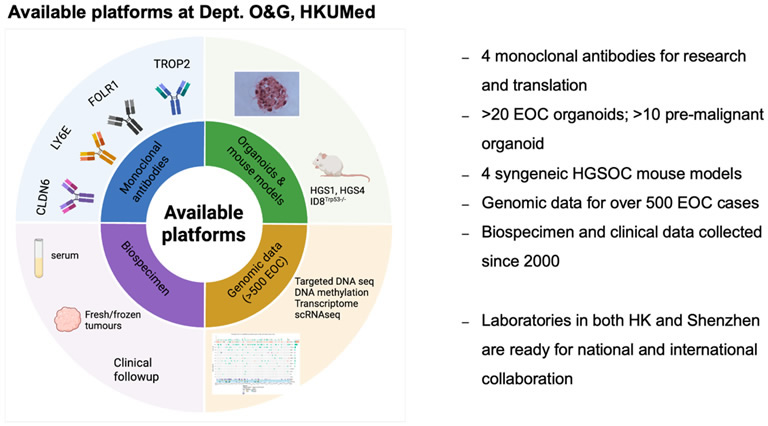Research Team
Gynaecological Oncology Research Direction
Our team covers both translational and clinical research in screening, early detection and treatment of gynaecological malignancies. The team’s translational research combines biobank resources and state-of-the-art genomic techniques, aiming to better delineate tumor origins and evolutionary trajectories. These foundational efforts support the development of highly sensitive, personalized diagnostic strategies for the early detection, improved surveillance, and timely intervention in gynaecological cancers.
Early detection of gynaecological cancers
Cervical cancer
- Our team had been working on cervical cancer prevention for the past ten years. Our research demonstrated the acceptability of the Human Papillomavirus (HPV) vaccine against cervical cancer amongst our community when the vaccine was first introduced in Hong Kong. Meanwhile, we collaborated in international Phase 3 clinical trials on the efficacy and safety of new HPV vaccines. Data from these studies contributed to the launch of the government’s school-based HPV immunisation programme.
- Apart from primary prevention with the vaccine, we also worked on cervical screening strategies. Our team conducted a large scale prospective randomised trial ( RCT ) on adopting HPV testing as a screening strategy. This study provided strong local evidence to support the Hong Kong government to revise the new cervical screening guidelines, adopting HPV testing as the main screening method in Hong Kong. Subsequently, this also changed the practice of cervical screening in Hong Kong. The government clinics have replaced cervical cytology by HPV testing for the whole population.
- The team is now conducting large-scale population studies to assess the role of HPV self-sampling—including noninvasive urine-based HPV testing—for enhancing cervical cancer screening rates, aiming to meet World Health Organization (WHO) 2030 targets and potentially inform changes in local screening protocols.
- Projects are underway to evaluate DNA methylation tests as reflex triage tools for women who test positive for high-risk HPV, promoting more efficient detection and management pathways.
Ovarian Cancer
- For ovarian cancer, we are pioneering multimodal biomarker discovery using tumor-secreted extracellular vesicles; studies are investigating exosomal membrane proteins and cancer-specific miRNA from blood samples to improve early-stage detection, particularly for high-grade serous ovarian cancer (HGSOC).
- Integrative approaches leveraging RNA sequencing and spatial transcriptomics are employed to identify candidate biomarkers linked to early precursor lesions, such as serous tubal intraepithelial carcinoma (STIC). This integrative approach bridges computational discovery with translational validation, offering insights into early HGSOC detection.

Understanding and overcoming immune evasion in ovarian cancer
- Building on recent approvals of immunotherapy for epithelial ovarian cancer, the group focuses on using advanced animal models and functional genomics to systematically discover and validate new immunotherapy targets, aiming to develop strategies that counter resistance and significantly improve treatment effectiveness.
- Key initiatives include investigating the role of tumor-derived factors like CXCL10, which has been found to induce terminal exhaustion of CD8 T cells and foster an immunosuppressive microenvironment in ovarian cancer. Blocking CXCL10 reinvigorates T cell function, suppresses tumor growth, and, when combined with anti-PD-1 therapy, shows promise for overcoming immunotherapy resistance.
- The team also leverages CRISPR screens to identify novel regulators of T cell, macrophage, and NK cell functions, providing new targets for combination immunotherapy that could enhance patient outcomes in ovarian cancer.

Therapeutic innovation in gynaecological cancers
- The team is utilizing patient-derived circulating tumor cell and organoid models to predict chemosensitivity, aiming to personalize treatment for platinum-resistant cases.
- We are also investigating the role of reactive oxygen species in chemoresistance and exploring the repurposing of FDA-approved drugs to target cancer stem cells.
- In collaboration with researchers in School of Biomedical Science, CUHK, we are investigating the genetic-drug sensitivity causes underlying exceptional therapeutic responses. This is the first exceptional responder study launching in Asia. We aim to create the first Hong Kong clinical exceptional responder gene-drug evidence resource to guide precision medicine clinical trial design in oncology.
- Our group is working on expanding the clinical impact of platforms like antibody-drug conjugates and bispecific T-cell engagers, which have shown promise in solid tumours. Through active collaboration with immunologists and chemists, we are engineering and developing novel antibodies specifically tailored for clear cell ovarian cancer patients. Efficacy tests are underway in both laboratory and animal models.

Clinical Trials/ Research
- Key initiatives include investigations into the optimal timing and appropriateness of ovarian debulking surgery at different treatment time points, aimed at improving surgical outcomes and patient quality of life.
- The group is also conducting collaborative research with experts in Traditional Chinese Medicine to explore approaches for alleviating treatment-induced side effects in gynecological cancer patients, recognizing the importance of supportive care in cancer management.
- The team is leading an investigator-initiated Phase 2 clinical trial evaluating the combination of targeted therapy and immunotherapy for recurrent cervical cancer.
- We continue to participate in international Phase 3 clinical trials investigating novel cancer treatment options for ovarian and endometrial cancers.








